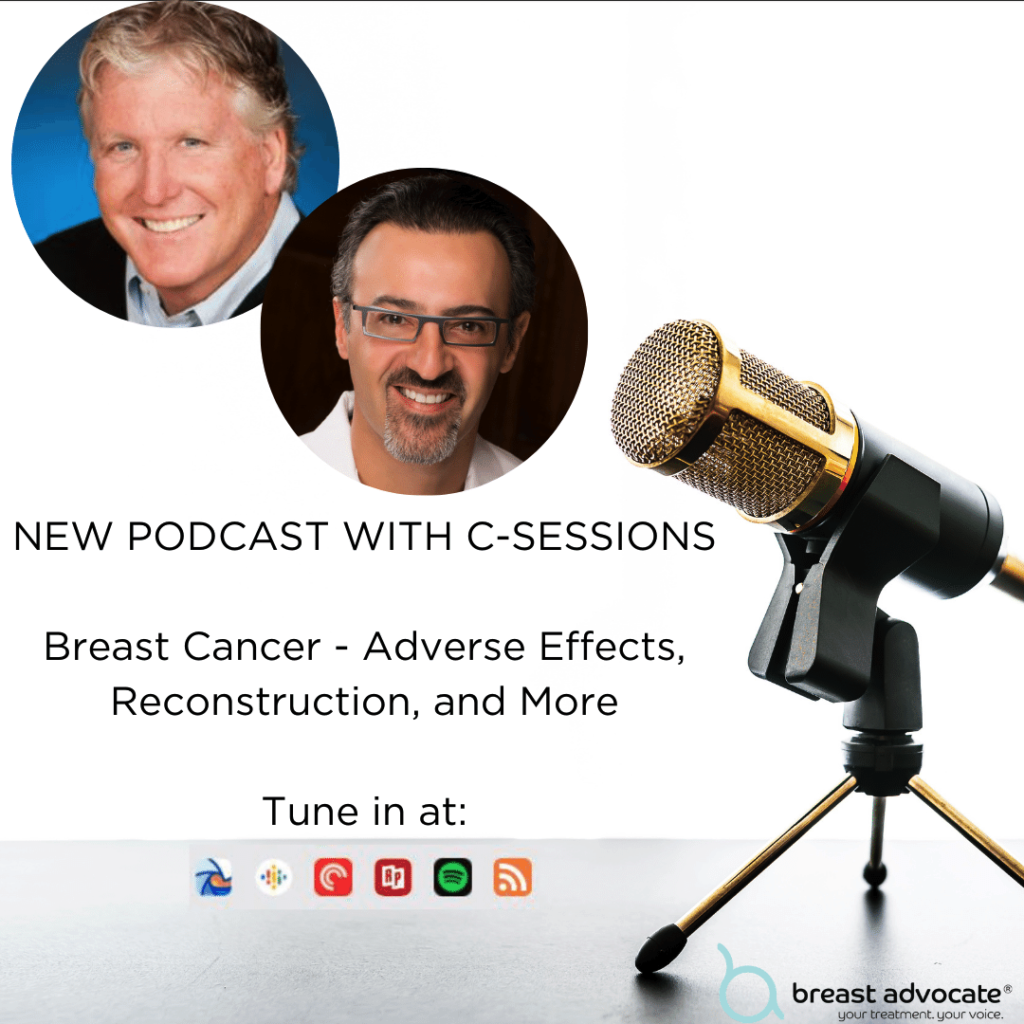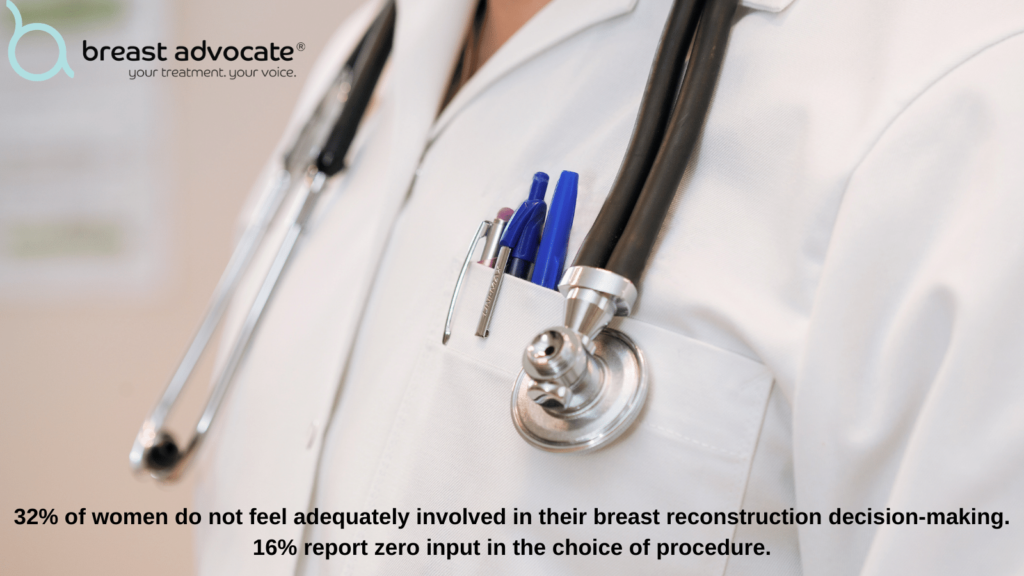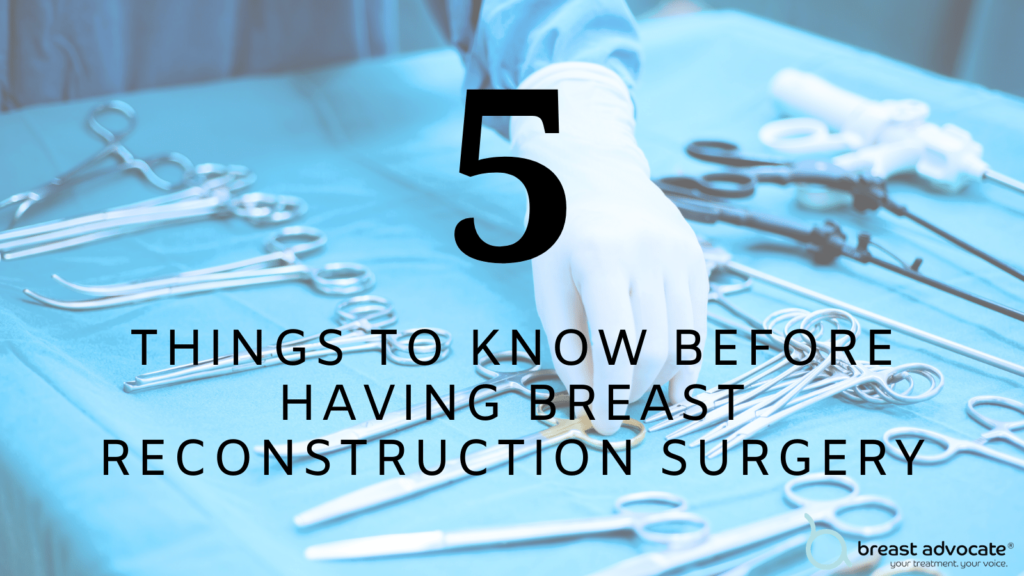The Importance of Knowing All Your Breast Cancer Surgery Options
Breast Advocate founder Dr. Minas Chrysopoulo recently joined the C-Sessions podcast for a discussion on breast cancer surgery, breast reconstruction, the potential adverse effects, and the importance of knowing all your surgical options throughout any stage of the breast cancer treatment journey.
Randall Broad graciously hosted the conversation which included Christine, a breast cancer survivor. Christine openly shared her experience of multiple lumpectomies, an eventual mastectomy, and then multiple attempts to reconstruct her breast with implants. A major contributing factor to Christine’s frustration has been the lack of access to all the information she felt she needed to make fully-informed surgical decisions from the get-go following her breast cancer diagnosis.
Christine’s experience unfortunately isn’t unique. When it comes to breast reconstruction in particular, 1 in 3 women feel they don’t have enough say in their treatment decision-making. The Breast Advocate® app was created to address this problem. Breast Advocate provides all the information patients need to make fully-educated decisions about which procedure is best for them after a breast cancer diagnosis. Download it free here.
Listen to the C-Sessions podcast here.

1 in 3 Women Don’t Have Enough Say in Their Breast Reconstruction Decision-Making

Patient’s relationships with their healthcare team can play a major role when it comes to planning medical procedures. In the setting of breast cancer surgeons can greatly influence surgical decision-making. This is particularly the case when it comes to breast reconstruction.
In the largest ever behavioral study focused on breast surgeons and breast cancer patients, results suggest surgeons play a bigger role in breast reconstruction planning than many patients would prefer. The study, published in the British Journal of Surgery, surveyed 53 surgeons, 101 breast cancer nurses, and 689 patients diagnosed with breast cancer.
According to the study, “approximately one in every three women (32%) stated their surgeon had more input than they did, when deciding which type of breast reconstruction to undergo.” Additionally, 16% of women felt they had zero input in the choice of reconstructive procedure they had. We find it very concerning that so many women in this study feel they played little to no role in deciding which type of breast reconstruction was best for them.
The Importance of Shared Decision-Making
This study is yet another example of why shared decision-making is so important, and why we created the Breast Advocate app!
We believe patients should be fully informed of all their breast reconstruction options, as well as the option of aesthetic flat closure (no reconstruction with a nicely-contoured, truly flat result). It is only once all the options are fully discussed, that patients can take part in a shared-decision-making conversation with their surgical team.
Shared decision-making occurs when the health care professional and patient work together to make a treatment decision that is best for the patient. The best decision takes into account evidence-based information about treatment options, the physician’s knowledge and experience, and the patient’s preferences and values. Multiple studies show this collaborative approach improves patient outcomes and satisfaction.
Co-created by leading breast cancer specialists and patient advocates, our free breast cancer surgery app provides evidence-based information and customized surgical recommendations, personalized for each individual user based on diagnosis and personal preferences. Regardless of an individual’s situation, users will have all the information and tools they need to take a more active role in decisions about their treatment.
5 Things You Should Know Before Having Breast Reconstruction Surgery

Breast implants are NOT the only option
The most commonly performed method of breast reconstruction performed today uses tissue expanders and implants. Although this approach is a good option for many, it’s not the only option. Likewise, implants may not be the best option for some patients. Reconstruction options using your own tissue (referred to as autologous or “flap” reconstruction) is also an option. In particular, after radiation treatment flap procedures are associated with fewer complications than implant-based reconstructions.
Sensory nerve reconstruction may be an option
Following a mastectomy, many patients experience permanent numbness to the chest area and reconstructed breast. This is because the sensory nerves that provide feeling are usually cut during the mastectomy. There is some good news though! Advances in breast reconstruction techniques have made sensory nerve reconstruction possible: reconnecting the sensory nerves in the chest can significantly improve the return of feeling to the reconstructed breast.
Enhanced Recovery After Surgery (ERAS) protocols are making recovery easier
Many surgeons are now implementing ERAS protocols to ensure their patients experience an easier recovery following breast cancer surgery, with or without reconstruction. Regardless of the type of reconstruction performed, ERAS protocols are reducing hospital stays, shortening recovery, and reducing the need for narcotics to control discomfort after surgery.
Shared decision-making matters
Breast reconstruction is not a one-size-fits-all procedure. Ensuring you discuss all your options and how they align with your lifestyle, preferences, and goals is critical in planning the best reconstructive option for you.
You can choose NOT to have breast reconstruction
It is important for patients to remember choosing NOT to undergo breast reconstruction and instead opting to “go flat” is an acceptable choice. Going flat (aesthetic flat closure) gives patients seeking no reconstruction the ability to maintain balance and symmetry without reconstructing the breast(s). Women can also choose to go flat after breast reconstruction if they are unhappy with their reconstruction results or have experienced complications after breast reconstruction.
To learn more about ALL your options, download the Breast Advocate App today!
Free App for Breast Cancer Treatment and Breast Reconstruction Decision-Making
A leader in breast cancer treatment education and shared decision-making, Breast Advocate® is excited to announce the release of our updated free app for breast cancer surgery and breast reconstruction. Thank you to our users for providing the valuable feedback that has helped make our app even better!

The latest updates greatly improve user experience and navigation, and give the innovative breast cancer app a fresh new look. Users can now customize the content they see on their dashboard via a personal feed, and easily find specific content using our optimized search engine.
Co-created by breast cancer specialists and patient advocates, the Breast Advocate® app provides anyone with breast cancer, a history of breast cancer, or at high risk for developing the disease a much needed voice in their treatment decision-making.
Should you have a lumpectomy or mastectomy? Should you have prophylactic surgery? Should you go flat or have breast reconstruction? If you want reconstruction, what type is best for you? Should you have gene testing? Our breast cancer app can help with these questions and much more.
The groundbreaking Breast Advocate® Wizard walks users through a detailed questionnaire to better understand their personal situation, preferences and goals. Our proprietary software combines evidence-based treatment options with the user’s preferences to create customized recommendations that are in line with the user’s specific needs. Breast Advocate® empowers users with the knowledge they need to fully discuss their treatment plan with their medical team and ensure they make the best decisions for them.
Users also have access to the latest expert opinions, published studies, helpful resources, and a community ready to provide support.
Download the latest version of the Breast Advocate app here.
How Patient Advocacy and Shared Decision-Making are Changing Breast Cancer Care
The rise of patient advocacy and shared decision-making are transforming breast cancer care.
Shared decision-making is a process whereby the patient and physician participate in the medical decision-making process together. The approach considers all evidence-based treatment options and associated risks, the physician’s expertise, together with the patient’s preferences, values and expectations to arrive at the best treatment plan for the patient. Multiple studies show this collaborative approach improves patient outcomes and satisfaction.
Empowered, self-educated patients are increasingly advocating for themselves, seeking to have a greater voice in their treatment planning. As the only shared decision-making breast cancer app in the World, Breast Advocate® is very proud to be able to facilitate the patient advocacy movement.
Now, patient advocacy is also making positive strides in the research arena. Nowhere has this been more evident than at the 2018 San Antonio Breast Cancer Symposium last month, where patients have become an integral part of the meeting. By participating on panels, asking questions and weighing in on research, patients have “shifted the direction of breast cancer research,” says Dr. Elaine Schattner. “By speaking up, advocates at the meeting have shifted the direction of breast cancer research. Some are alive, improbably, as a consequence of new treatments enabled and promoted by their advocacy.”
Collaboration can only make things better. We look forward to patient advocates having a constant seat at the table at many more scientific meetings!
Breast Advocate Founder Moderates Shared Decision-Making Panel At ASPS ‘The Meeting’
Breast Advocate’s Founder Dr. Minas Chrysopoulo this month had the honor of moderating a panel on the importance of shared decision-making in breast reconstruction at this year’s American Society of Plastic Surgeons (ASPS) annual meeting in Chicago. ‘The Meeting’ is the largest plastic surgery meeting in the World and welcomes surgeons from all over the globe. Dr Chrysopoulo had the privilege of being joined on the panel by Breast Advocate co-contributor Dr Hani Sbitany, and patient advocates Terri Coutee and Kirstin Litz.
“Once upon a time, I’d tell a patient their breast reconstruction options and the associated risks and recommend what I thought was best. Then I discovered shared decision-making and it changed my practice forever,” shared Dr. Minas Chrysopoulo.
What exactly is “shared decision-making”?
Shared decision-making is the conversation and information exchange that happens between a patient and their healthcare professional to reach a treatment plan together. The doctor ensures the patient is fully educated about all their treatment options and the associated risks, while the patient shares their preferences, values and any other personal factors that are important in reaching the best plan for the patient.
Shared decision-making flies in the face of the paternalistic approach to healthcare delivery and instead empowers patients to have an equal voice in their treatment planning – It was the driving philosophy behind the creation of the Breast Advocate App.
Listen to the entire shared decision-making presentation here.






